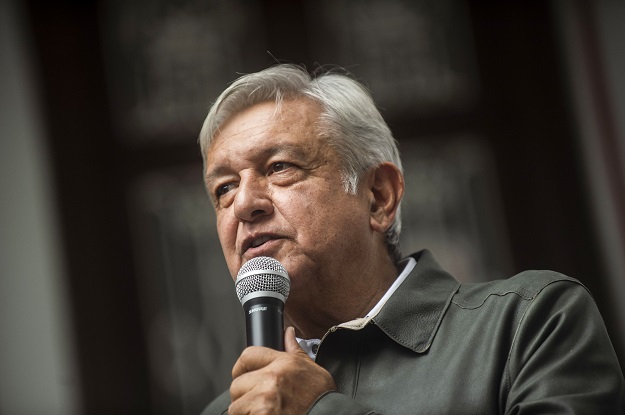Subscribe here to receive AMLO This Week by email
Correction appended below.
It was a big week for trade in Andrés Manuel López Obrador’s Mexico.
Jesús Seade, López Obrador’s pick to lead NAFTA negotiations, suggested the incoming administration could show flexibility on key sticking points in the ongoing trade talks. Seade told The Wall Street Journal that negotiators “should be willing to explore options and alternatives” on conflict resolution mechanisms, and suggested room for “an intermediate position” on rules of origin for the automotive sector.
Seade traveled to Washington on Thursday for a bilateral NAFTA session with U.S. and Mexican government officials. Though Seade participated as an observer, some analysts questioned his presence at the negotiating table, saying López Obrador’s signal of flexibility could lead the U.S. to wait for a better deal from the incoming administration.
Earlier in the week, Seade and others met in Mexico City with a Canadian delegation led by foreign secretary Chrystia Freeland. In a press conference following the meeting, López Obrador’s team said it was committed to keeping NAFTA a trilateral agreement.
While both U.S. and Mexican officials have recently expressed optimism about the talks, the threat of Donald Trump still looms: In a letter to López Obrador made public this week, the U.S. president threatened to “go a much different route” that would be “far more profitable for the United States and its taxpayers” if the talks aren’t concluded quickly.
The Energy Team
López Obrador on Friday presented the team he’ll ask to oversee what could be a major shift in Mexican energy policy. Among the more familiar names was Manuel Bartlett, who will take over as head of CFE, Mexico’s state-run electric utility. Bartlett, who served as interior secretary for former President Miguel de la Madrid, has called President Enrique Peña Nieto’s 2013 energy reforms a “betrayal.”
Octavio Romero Oropeza, a long-time AMLO supporter and former congressman, will serve as general director of state-oil firm Pemex. López Obrador also confirmed that he would nominate Rocío Nahle, a congresswoman and former Pemex hand, as energy secretary, and Alberto Montoya as undersecretary. On the whole, López Obrador’s nominees are seen as having a strong nationalistic bent regarding natural resource production.
When making the announcement, López Obrador also said he would devote 175 billion pesos (about $9.4 billion) next year to “rescuing” Mexico’s energy industry – including an additional 75 billion pesos for Pemex to explore and drill for oil. He also stood by his pledge to build a new oil refinery, planned for his home state of Tabasco, and a promise that gas prices would fall three years into his term. Back in 2013, Peña Nieto made similar promises about gas and electricity prices. His (largely successful) energy reform might be more popular today had he not.
Party’s Over
Members of Congress from López Obrador’s Morena party on Wednesday proposed a constitutional reform that would reduce public funding for political parties by 50 percent. Rodrigo Abdalá, a Morena congressman, called the current system a “perverse spiral of money that has helped widen political corruption.”
Mexico’s political parties receive federal funding based in part on their share of seats in Congress. After a slew of election victories on July 1, Morena’s share of the pot is set to grow substantially – from about $24 million of regular funding in 2018 to $86 million next year. Under current rules, Mexico’s parties would receive a total of $273 million in 2019. Voting on the initiative could begin as early as August.
Security
López Obrador began the week on July 22 by providing additional details about a series of public forums aimed at helping the incoming administration craft a plan to deal with endemic crime and violence.
These “pacification and national reconciliation” forums will take place between Aug. 7 and Oct. 24 in cities throughout the country. The administration says it will then present a concrete plan, which is expected to include some type of amnesty for low-level offenders. Religious leaders, nonprofit organizations, academics and others have been invited to participate in the meetings.
A series of forums will also be held in immigration centers, indigenous communities and in a number of prisons and juvenile detention centers. Ernesto López Portillo of the Mexican Forum for Democratic Security told newspaper Reforma that López Obrador’s plan to listen to inmates’ opinions would “help give a qualitative understanding of the life stories of people who live violence and, in this case, create violence.”
Mexico City’s New Airport
López Obrador’s pick for transportation secretary, Javier Jiménez Espriú, told Animal Político that the incoming government would be the final arbiter on a $13.3 billion airport development project currently underway on the outskirts of Mexico City. The interview clarified López Obrador’s pledge to hold “public consultations” on whether to move forward with the project.
“We may open a mechanism to take public opinion,” Espriú said. “But as the government we will take responsibility for the final decision.”
López Obrador has been openly critical of the project, which would make Mexico City’s airport one of the most expensive in the world. On the campaign trail, he pledged to cancel the development in favor of a smaller – and technically dubious – alternative before agreeing to further consultation with experts. The group overseeing the airport’s construction this week suspended four public construction tenders until the future of the project is decided.
The airport is one of the incoming administration’s seven priority development projects, which also include earthquake reconstruction and a rail corridor across the Isthmus of Tehuantepec. López Obrador says the projects will cost 500 billion pesos (about $27 billion).
Due to an editing error, an earlier piece stated that López Obrador’s team said in a press conference that it would not accept a so-called sunset clause in regards to NAFTA. This position was clarified by Seade in the Wall Street Journal, not in a press conference. This piece was also updated to clarify the date López Obrador gave more details about his security forums.
—
Russell is AQ’s correspondent in Mexico City






